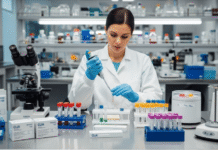Collagen is a highly important protein found within the human body for the preservation of skin elasticity, hydration, and strength. Traditionally, collagen used for skin care products originated from animal sources, including bovine and marine collagen. But with rising ethical considerations, sustainability issues, and the risk of allergenic reactions, lab-grown collagen has been developed. This article discusses the advantages, methods of synthesis, and efficacy of lab-grown collagen as an ethical and therefore sustainable alternative to animal-derived collagen, with scientific research and dermatological studies as its bases.
The Need for Sustainable Collagen in Skincare
The global demand for collagen has increased significantly due to its role in anti-aging and skin rejuvenation. Conventional collagen extraction from animals raises ethical concerns regarding animal welfare and contributes to environmental degradation (Avila Rodríguez et al., 2018). Additionally, there is variability in purity, safety concerns related to contamination, and religious and dietary restrictions affecting consumer choices. Lab-grown collagen, also known as bioengineered or recombinant collagen, presents a viable solution to these concerns by offering a cruelty-free, consistent, and sustainable alternative.
How Lab-Grown Collagen is Produced
Lab-grown collagen is produced by the cutting-edge biotechnology techniques, primarily by microbial fermentation and genetic engineering. The two above approaches are:
- Microbial Fermentation: Scientists genetically alter microbes like Escherichia coli or Pichia pastoris to express human collagen genes. The engineered microorganisms produce collagen proteins that are very similar to human natural collagens (Ricard-Blum, 2011). It is an unblemished process subject to scaling and sustainability.
- Stem Cell and Tissue Engineering: Bioengineered human skin models or stem cells have been employed by researchers for the production of collagen in the controlled environment of laboratories. It is more complex and possible to produce collagen that is functionally identical to that present in humans (Chung et al., 2021).
Benefits of Lab-Grown Collagen in Skincare
The advantages that lab-cultivated collagen has over traditional sources from animals makes it the better collagen choice for modern skincare formulators.
1. Ethical and Cruelty-Free
A significant advantage of lab-cultivated collagen is that it eliminates animal-derived sources. The trend for animal-friendly and vegan skincare products is fast taking root among consumers (Avila Rodríguez et al., 2018).
2. Environment-Safe and Sustainable.
Animal collagen production is virtually dependent on animals, and given the large-scale livestock farming taken to raise cattle and other animals for human consumption, the practice has a direct relationship with deforestation and on the most extreme, land use change, water consumption, greenhouse gas emissions, and biofuoyancy. In contrast, lab-grown collagen is cultivated under very strict controlled conditions-in environmental impact reduction and preservation of natural resource conservation (Ricard-Blum, 2011).
3. Biocompatibility and Safety
In contrast, with animal-derived collagen potentially being risked by contamination or immune rejection, lab-grown collagen could theoretically be engineered to be structurally identical to human collagen. This would, in turn, reduce the chances of an allergic reaction and be made compatible with human skin (Chung et al., 2021).
4. Purity Enhanced and Homogeneous
The quality of traditional collagen is subject to variations caused by differences in extraction methods and health conditions of the animals. Lab-grown collagen, on the other hand, is produced under extremely stringent biotech controls, thus showing uniformity of quality and potency in skincare formulations (Ricard-Blum, 2011).
5. Enhancing Skin Absorption
Some forms of lab-grown collagen have been engineered to be better bioavailable, making it easier for the skin to absorb compared with traditional collagen peptides. It is a significant improvement in hydration, elasticity, and overall skin health (Chung et al. 2021).
Challenges and Future Perspectives
However, some barriers must be overcome before lab-grown collagen can become commonplace:
- High Production Costs: The current cost of bioengineering technology for collagen is so high that lab-grown collagen is still more expensive than the previous sources (Avila Rodríguez et al., 2018).
- Regulatory Approval: Since lab-grown collagen is relatively novel, it will have to go through rigorous verifications before getting permission for use.
- Consumer Awareness and Acceptance: It is still a new experience to many, making it necessary to orient the public as a whole on this benefit and advantage over traditional collagen.
From here, further development in biotechnology, augmented investment in the research endeavor, and improvements in big budget productions are supposed to make lab-grown collagen more accessible and affordable. Such a paradigm cannot do anything but change the game in skincare that is both ethical and efficient, as it is toward sustainability in local markets.
A newly emerging field of lab-cultured collagen makes for a sustainable, ethical alternative for animal collagen, while providing a superior performance. Being cruelty-free, environmental-friendly, and exhibiting excellent compatibility with biological systems, bioengineered collagen fits in beautifully with the notion of conscious consumerism and scientific innovation. With the continuous refinement of production through research and technology, lab-cultured collagen is on its way to becoming a central ingredient in the next-generation formulation for skincare.
References
- Avila Rodríguez, M. I., Rodríguez Barroso, L. G., & Sánchez, M. L. (2018). Collagen: A review on its sources and potential cosmetic applications. Journal of Cosmetic Dermatology, 17(1), 20-26. https://doi.org/10.1111/jocd.12450
- Chung, H. J., Seo, D. H., Lee, D. S., & Kim, H. K. (2021). Advances in recombinant collagen production: Strategies and applications in tissue engineering and skincare. Biotechnology Advances, 49, 107738. https://doi.org/10.1016/j.biotechadv.2021.107738
- Ricard-Blum, S. (2011). The collagen family. Cold Spring Harbor Perspectives in Biology, 3(1), a004978. https://doi.org/10.1101/cshperspect.a004978











